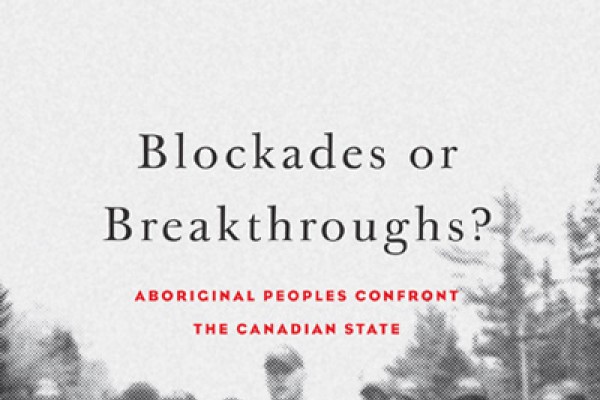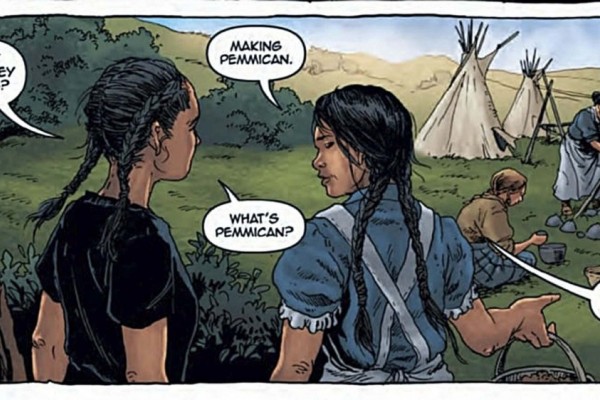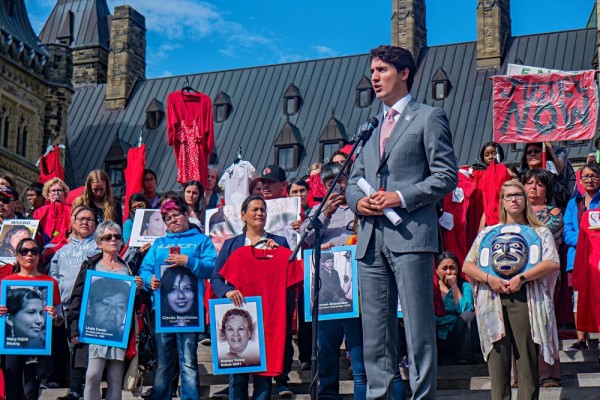Pierre Poilievre and the Conservatives have a residential school denialism problem
If the Tories fail to unequivocally renounce residential school denialism, they risk paying a political price on April 28

Aaron Gunn and Conservative Party leader Pierre Poilievre. Photo courtesy Aaron Gunn/Facebook.
Pierre Poilievre is facing an intense backlash for standing by Aaron Gunn, a controversial federal election candidate in the British Columbia riding of North Island–Powell River, who has defended residential schools.
Poilievre’s decision to support a candidate engaging in residential school denialism is disappointing but not surprising. There is a clear pattern of denialism and anti-Indigenous racism within the Conservative Party of Canada.
Now that the April 7 deadline to select another candidate has passed, Poilievre and the Conservatives have clearly chosen to side with Gunn. As a result, they face a self-inflicted political crisis that risks turning off even more voters and fuelling damaging misinformation about one of Canada’s most shameful legacies.
Twisting truth
Gunn, a far-right social media influencer, has consistently promoted residential school denialism. For example, he uncritically celebrated John A. Macdonald, an architect of the residential school system; he falsely suggested that Indigenous leaders asked for the residential school system; he rejected the fact that residential schooling was genocide; and he pushed the “mass grave hoax” conspiracy theory.
He has since deleted many of his posts on X—odd for a candidate insisting he’s said nothing wrong—but his comments are textbook residential school denialism.
Residential school denialism, to be clear, is a strategy of twisting, misrepresenting, or minimizing facts about residential schooling for personal or political gain. The goal is to shake public confidence in truth and reconciliation and, in the process, protect the church, the state, and Canada’s settler capitalist status quo.
Many Indigenous leaders, including in Gunn’s own riding, have condemned his comments and highlighted the hurt that denialism causes.
A pattern of denialism
Gunn, however, is not an anomaly. Indeed, the rot of anti-Indigenous racism and residential school denialism runs deep in the Conservative Party. Seeing the pattern helps put this controversy, and Poilievre’s own support for denialism, in context.
In 2008, former Prime Minister Stephen Harper issued an apology to residential school survivors in the House of Commons. While some have critiqued the apology for not going far enough, it was a watershed moment that ushered in the era of truth and reconciliation.
However, it was not long before the Conservatives undermined their goodwill with survivors. In 2013, Paul Bunner, Harper’s speech writer, admitted that he thought residential schooling was a “bogus genocide story” that propagated an “entitlement narrative” with “perverse financial incentives.” He also noted that the Conservatives only apologized to survivors in 2008 out of political necessity and hoped that Harper’s speech would bury the issue once and for all.
It did not. The Truth and Reconciliation Commission (TRC) started its work in 2008, and released its final report in 2015.
Most Canadians accepted the commission’s conclusions and 94 Calls to Action. Others, however, tried to delegitimize and refute the report, especially those on the right.
One such person was Lynn Beyak, the Conservative senator who in 2017 defended residential schooling as being “well-intentioned” and attacked criticism of her comments as “fake news.” The Conservative leader at the time, Andrew Scheer, eventually kicked Beyak out of the Conservative caucus, arguing that the party has “no room for intolerance, racism or extremism.”
Just a few years later, Erin O’Toole, Scheer’s successor, was caught on camera coaching young conservatives at Toronto Metropolitan University on how to twist residential school facts for political advantage (downplay the system’s Conservative origins, play up Liberal involvement and emphasize the educational benefits). He quickly walked back his comments but did not actually apologize and declined repeated requests from APTN, Canada’s only Indigenous broadcaster, for an interview.
But what about Poilievre?
In June 2008, he skipped out on the apology to residential school survivors to join an Ottawa radio station where he spread anti-Indigenous racism, saying Indigenous peoples need to learn the “values of hard work” rather than receive financial compensation for their residential school experience. Harper dressed-down Poilievre for his comments, and he reluctantly addressed the House of Commons the next day saying: “I accept responsibility for them and I apologize.”
Since his 2008 controversy, Poilievre has avoided saying much about residential schooling—making it appear he learned his lesson. In 2022, the House of Commons, with Conservative MPs, including Poilievre, in attendance, unanimously voted to recognize residential schooling as genocide.
However, aligning with Gunn now proves that Poilievre is still part of the problem.
At a recent campaign stop in Osoyoos, BC, the Conservative leader dismissed claims that Gunn promoted residential school denialism as “misinformation.”
Poilievre’s defense of Gunn hinged on his own twisting of the truth. In trying to protect his candidate, he said that Gunn has “not denied the impact of residential schools.” This, however, is a sleight of hand. As explained above, residential school denialism is not the outright denial of the system’s existence or even a failure to recognize its impact. Gunn, like others, is engaging in residential school denialism, not denial.
This rhetorical trick—quibbling about definitions to erode their meaning or suitability—is one of the most common talking points that Daniel Heath Justice and I outline in our primer on how to identify residential school denialism.
Taking sides
This all poses a serious political problem for Poilievre.
He wants Gunn to win the North Island–Powell River seat, but by taking the controversial candidate’s side he’s proving to Canadians across the country that the Conservatives tolerate residential school denialism and other kinds of toxic misinformation.
This demonstrates a clear lack of leadership on Poilievre’s part, just at the time when Canadians are looking to reject Trumpism and the slippery and hateful tactics of the far-right.
Furthermore, while Poilievre is focused on “unapologetically” defending the past and doubling down on his support for Gunn’s denialism, other federal party leaders are refuting residential school denialism. They are clearly outlining their commitments to truth and reconciliation as part of their plan to build a more just future. These positions now stand in striking contrast for the Canadian electorate.
The way forward is clear.
Putting truth before reconciliation means we, as a society, have no tolerance for hate, misinformation, and anti-Indigenous racism.
It’s time for Poilievre and the Conservatives to move on from Gunn and leave residential school denialism behind once and for all.
If the Conservatives are truly serious about “common sense,” they must unequivocally renounce residential school denialism—or else risk paying a political price on April 28.
Sean Carleton is an associate professor of history and Indigenous Studies at the University of Manitoba.










